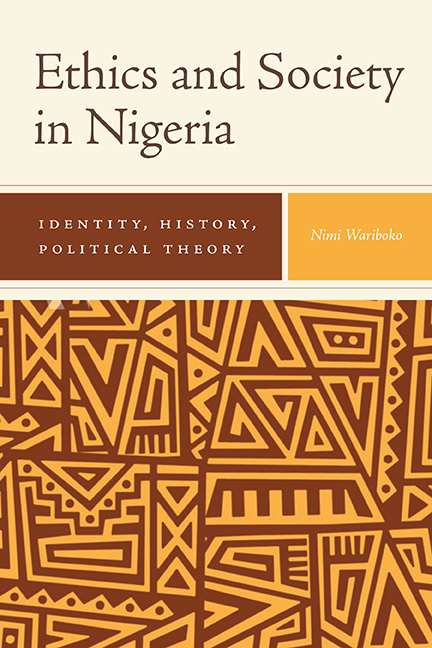Book contents
- Frontmatter
- Dedication
- Contents
- Foreword
- Preface
- Acknowledgments
- Introduction: Dead Gods, Divine Kings, and Deadly Politicians
- 1 The Emergence of the Lotus-Self: Personhood and Identity
- 2 Dead Gods and People's Revolts: Political Theory in Religious Acts
- 3 The Divine King and His Five Bodies: Living History and the Logic of Interreligious Dialogue
- 4 Governance and Deadly Politicians: History as Cultural Criticism
- 5 History without Force: Finding Present Space and Place of Time
- 6 Constructing Nigeria's Greatness: Neglected Paths of Community, Narratives, and Care of the Soul
- 7 Mythos, Virtues, and National Transformation: The Search for a Standard of Citizenship Moral Behavior
- 8 African Traditional Religion and Critical Theory: A Framework for Social Ethics
- Notes
- Bibliography
- Index
6 - Constructing Nigeria's Greatness: Neglected Paths of Community, Narratives, and Care of the Soul
Published online by Cambridge University Press: 03 September 2019
- Frontmatter
- Dedication
- Contents
- Foreword
- Preface
- Acknowledgments
- Introduction: Dead Gods, Divine Kings, and Deadly Politicians
- 1 The Emergence of the Lotus-Self: Personhood and Identity
- 2 Dead Gods and People's Revolts: Political Theory in Religious Acts
- 3 The Divine King and His Five Bodies: Living History and the Logic of Interreligious Dialogue
- 4 Governance and Deadly Politicians: History as Cultural Criticism
- 5 History without Force: Finding Present Space and Place of Time
- 6 Constructing Nigeria's Greatness: Neglected Paths of Community, Narratives, and Care of the Soul
- 7 Mythos, Virtues, and National Transformation: The Search for a Standard of Citizenship Moral Behavior
- 8 African Traditional Religion and Critical Theory: A Framework for Social Ethics
- Notes
- Bibliography
- Index
Summary
History is the origin of the world, but political theorists are not so much afraid of it or so loath the deep that they penetrate it at the sides. A tehomic social ethics gathers the germinating potential of the fluid encounter to construct paths to human flourishing in places where the earth is still formless and empty.
Penetrating History and Africanity for Social Ethics
At the beginning of this book I promised that I would situate the arguments of this chapter within the context of Africanity to frame some dimensions of our discourse through the mediating and contestable concept of an intellectual identity. I made the promise because this chapter began as an invitation (challenge) to think the re/construction of Africa's greatness in ways that take Africanity seriously. The following is what sometimes happens to the process of researching and writing a book. Organizers of a major conference invite you to give a keynote address that apparently fits with your current project. But there is always a catch! They request that you enlarge your thought to include their theme. This is what happened to me in 2015, and the request was not merely a catalytic incident in the evolution of this chapter, but a scholarly, postcolonial factor that had to be incorporated into the difficult and risky task of discerning paths to national social transformation. I was invited to give the keynote address of the 2016 Toyin Falola Annual International Conference on Africa and the African Diaspora (TOFAC) to be held in Nigeria. This encounter, this request to reckon with Africanity as an intellectual identity in the task of thinking about transforming Nigeria's social ethics—more precisely Nigeria's socioethical identity—shaped the ideas you are about to read in this chapter. The organizers of TOFAC define Africanity in this way:
Africanity connotes a sense of recognition of the Africanness of the African, the essence of being an African, and an awareness of mental decolonization. The concept of Africanity arose as a response to various attempts on the part of the West to deny the contributions of Africa to world civilization, and to demean its great institutions. African identity has been severely and exceptionally assaulted, maligned, denied, and manipulated by external forces, including colonizing and neocolonizing epistemologies.
- Type
- Chapter
- Information
- Ethics and Society in NigeriaIdentity, History, Political Theory, pp. 116 - 132Publisher: Boydell & BrewerPrint publication year: 2019



